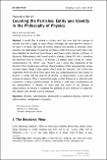Files in this item
Counting the Particles : Entity and Identity in the Philosophy of Physics
Item metadata
| dc.contributor.author | Berto, Francesco | |
| dc.date.accessioned | 2018-09-07T11:30:05Z | |
| dc.date.available | 2018-09-07T11:30:05Z | |
| dc.date.issued | 2017-04-01 | |
| dc.identifier | 255688905 | |
| dc.identifier | 8555c50f-7f63-484f-8ab0-e5b69745384a | |
| dc.identifier | 85018794388 | |
| dc.identifier.citation | Berto , F 2017 , ' Counting the Particles : Entity and Identity in the Philosophy of Physics ' , Metaphysica , vol. 18 , no. 1 , pp. 69-89 . https://doi.org/10.1515/mp-2017-0001 | en |
| dc.identifier.issn | 1437-2053 | |
| dc.identifier.other | ORCID: /0000-0003-3246-657X/work/48132011 | |
| dc.identifier.uri | https://hdl.handle.net/10023/15988 | |
| dc.description.abstract | I would like to attack a certain view: The view that the concept of identity can fail to apply to some things although, for some positive integer n, we have n of them. The idea of entities without self-identity is seriously entertained in the philosophy of quantum mechanics (QM). It is so pervasive that it has been labelled the Received View (French and Krause 2006. Identity in Physics: A Historical, Philosophical, and Formal Analysis. Oxford: Oxford UP: 105). I introduce the Received View in Section 1. In Section 2 I explain what I mean by entity (synonymously, by object and thing), and I argue that supporters of the Received View should agree with my characterization of the corresponding notion of entity (object, thing). I also explain what I mean by identity, and I show that supporters of the Received View agree with my characterization of that notion. In Section 3 I argue that the concept of identity, so characterized, is one with the concept of oneness. Thus, it cannot but apply to what belongs to a collection with n elements, n being a positive integer. In Section 4 I add some considerations on the primitiveness of identity or unity and the status of the Identity of Indiscernibles. In Section 5 I address the problem of how reference to indiscernible objects with identity can be achieved. | |
| dc.format.extent | 21 | |
| dc.format.extent | 1815182 | |
| dc.language.iso | eng | |
| dc.relation.ispartof | Metaphysica | en |
| dc.rights | © 2017 Walter de Gruyter GmbH, Berlin/Boston. This work has been made available online in accordance with the publisher’s policies. This is the final published version of the work, which was originally published at: https://doi.org/10.1515/mp-2017-0001. | en |
| dc.subject | Identity | en |
| dc.subject | Identity of indiscernibles | en |
| dc.subject | Individuation | en |
| dc.subject | Metaphysics of physics | en |
| dc.subject | Philosophy of quantum physics | en |
| dc.subject | B Philosophy (General) | en |
| dc.subject | Philosophy | en |
| dc.subject | T-NDAS | en |
| dc.subject.lcc | B1 | en |
| dc.title | Counting the Particles : Entity and Identity in the Philosophy of Physics | en |
| dc.type | Journal article | en |
| dc.contributor.institution | University of St Andrews.Philosophy | en |
| dc.identifier.doi | 10.1515/mp-2017-0001 | |
| dc.description.status | Peer reviewed | en |
| dc.date.embargoedUntil | 2018-03-18 |
This item appears in the following Collection(s)
Items in the St Andrews Research Repository are protected by copyright, with all rights reserved, unless otherwise indicated.

